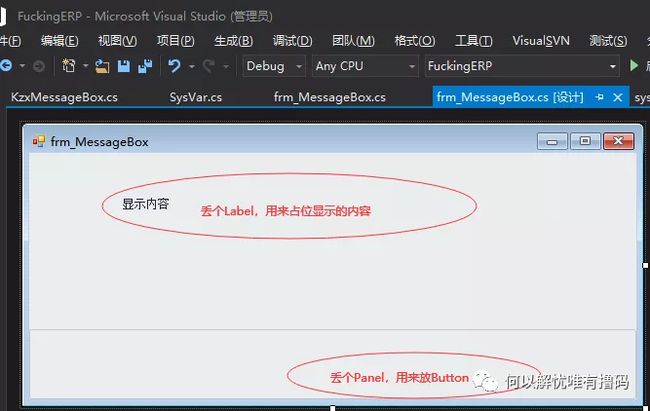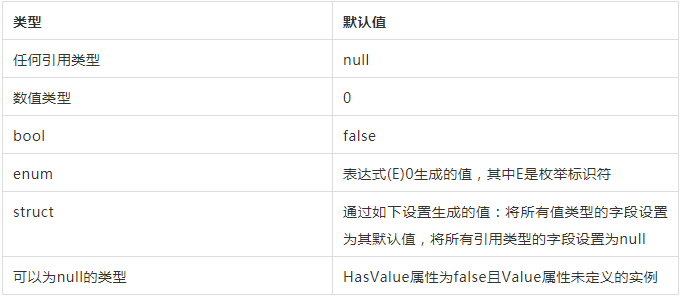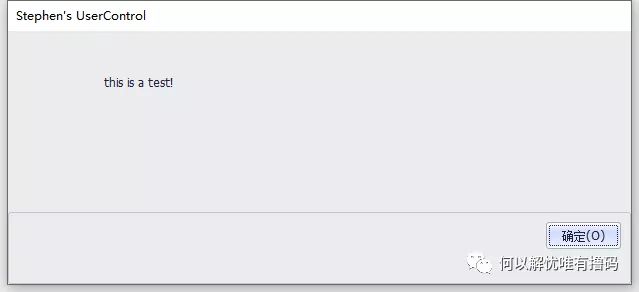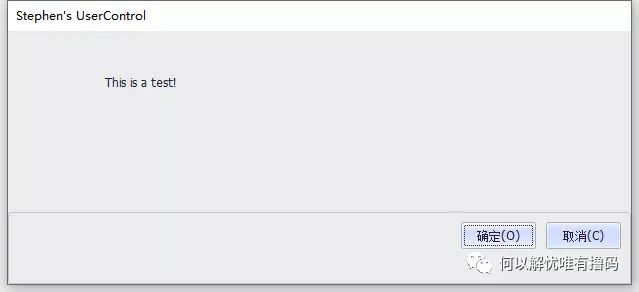很久没有更新博客了,本想着直接发一篇《手撕ERP》系列,从控件重写、重绘,到框架搭建,再到部分模块实现+业务的。但是每次动手的时候,都觉得难以下手。直接从数据库设计开始吧,模块设计还没定下来,从模块设计开始吧,winform自带控件和DevExpress控件用起来布局实在太难看了。算了,从低做起吧。接着6-7年前的玩转控件系列开始,工欲善其事必先利其器!利器备好,框架搭建完毕,模块设计就是拖控件而已!
Talk is Cheap,Show me the Code!
首先,项目中新建一个窗体(用于后面的弹窗载体),按自己意愿做好布局效果,当然关于皮肤方面,大家可以应用界内很成熟的皮肤控件(具体就不列举了,避免打广告的嫌疑),或者后期自己代码实现。本篇主要介绍如何重写/重绘控件,磨自己的利器,至于利器上贴个动漫图片还是其他花里胡哨的图案,请根据自己的喜好来。大概效果如图(有洁癖的请自己细心布局):
窗体后台代码分析如下:
首先窗体集成DevExpress:
public partial class frm_MessageBox : DevExpress.XtraEditors.XtraForm
其余初始化动作代码如下,备注很详细就不一一列举了:
////// 确定按钮 /// private SimpleButton btn_OK; /// /// 取消按钮 /// private SimpleButton btn_Cancel; /// /// 中止按钮 /// private SimpleButton btn_Abort; /// /// 重试按钮 /// private SimpleButton btn_Retry; /// /// 忽略按钮 /// private SimpleButton btn_Ignore; /// /// 是按钮 /// private SimpleButton btn_Yes; /// /// 否按钮 /// private SimpleButton btn_No; /// /// 要在消息框中显示的文本 /// private string text; /// /// 要在消息框的标题栏中显示的文本 /// private string caption; /// /// System.Windows.Forms.MessageBoxButtons 值之一,可指定在消息框中显示哪些按钮 /// private MessageBoxButtons buttons; /// /// System.Windows.Forms.MessageBoxIcon 值之一,它指定在消息框中显示哪个图标 /// private MessageBoxIcon icon; /// /// System.Windows.Forms.MessageBoxDefaultButton 值之一,可指定消息框中的默认按钮。 /// private MessageBoxDefaultButton defaultButton; /// /// 消息弹出框参数实体 /// MessageBoxModel _MessageBoxModel = default(MessageBoxModel);
界面初始化:
////// 支持修改弹出框的按钮标题描述 /// /// public frm_MessageBox(MessageBoxModel pMessageBoxModel) { InitializeComponent(); if (pMessageBoxModel == null) pMessageBoxModel = new MessageBoxModel(); this.ControlBox = false; this.text = pMessageBoxModel.MsgText; this.Text = pMessageBoxModel.FormText ?? "Stephen's UserControl"; this.caption = pMessageBoxModel.FormText; this.buttons = pMessageBoxModel.MsgButton; this.icon = pMessageBoxModel.MsgIcon; this.defaultButton = pMessageBoxModel.MsgxDefaultButton; this._MessageBoxModel = pMessageBoxModel; } /// /// 显示一个具有指定文本、标题、按钮、图标、默认按钮的消息框 /// /// /// /// /// /// public frm_MessageBox(string text, string caption, MessageBoxButtons buttons, MessageBoxIcon icon, MessageBoxDefaultButton defaultButton) { InitializeComponent(); this.ControlBox = false; this.text = text; this.Text = caption ?? "Stephen's UserControl"; this.caption = caption; this.buttons = buttons; this.icon = icon; this.defaultButton = defaultButton; }
窗体Load事件绑定弹窗按钮事件:
private void frm_MessageBox_Load(object sender, EventArgs e) { int pannelLength = panelButton.Size.Width; switch (buttons) { case MessageBoxButtons.OK: #region OK this.btn_OK = new SimpleButton(); this.panelButton.SuspendLayout(); //btn_OK this.btn_OK.Anchor = ((System.Windows.Forms.AnchorStyles)((((System.Windows.Forms.AnchorStyles.Top | System.Windows.Forms.AnchorStyles.Bottom) | (System.Windows.Forms.AnchorStyles.Right))))); this.btn_OK.Name = "btn_OK"; this.btn_OK.Size = new System.Drawing.Size(75, 27); this.btn_OK.Location = new Point(pannelLength - 85, 10); this.btn_OK.TabIndex = 0; if (_MessageBoxModel != null) this.btn_OK.Text = _MessageBoxModel.YesButtonText; else this.btn_OK.Text = sysClass.ssLoadMsgOrDefault("SYS000001", "确定(O)");//确定(O) this.btn_OK.Margin = new Padding(0, 2, 2, 2); this.btn_OK.Click += btn_OK_Click; this.panelButton.Controls.Add(this.btn_OK); this.panelButton.ResumeLayout(); #endregion break; case MessageBoxButtons.OKCancel: #region OKCancel this.btn_OK = new SimpleButton(); this.btn_Cancel = new SimpleButton(); this.panelButton.SuspendLayout(); //btn_OK this.btn_OK.Anchor = ((System.Windows.Forms.AnchorStyles)((((System.Windows.Forms.AnchorStyles.Top | System.Windows.Forms.AnchorStyles.Bottom) | (System.Windows.Forms.AnchorStyles.Right))))); this.btn_OK.Name = "btn_OK"; this.btn_OK.Size = new System.Drawing.Size(75, 27); this.btn_OK.Location = new Point(pannelLength - 170, 10); this.btn_OK.TabIndex = 0; if (_MessageBoxModel != null) this.btn_OK.Text = _MessageBoxModel.YesButtonText; else this.btn_OK.Text = sysClass.ssLoadMsgOrDefault("SYS000001", "确定(O)");//确定(O) this.btn_OK.Margin = new Padding(0, 2, 2, 2); this.btn_OK.Click += btn_OK_Click; this.panelButton.Controls.Add(this.btn_OK); //btn_Cancel this.btn_Cancel.Anchor = ((System.Windows.Forms.AnchorStyles)((((System.Windows.Forms.AnchorStyles.Top | System.Windows.Forms.AnchorStyles.Bottom) | (System.Windows.Forms.AnchorStyles.Right))))); this.btn_Cancel.Name = "btn_Cancel"; this.btn_Cancel.Size = new System.Drawing.Size(75, 27); this.btn_Cancel.Location = new Point(pannelLength - 85, 10); this.btn_Cancel.TabIndex = 1; if (_MessageBoxModel != null) this.btn_Cancel.Text = _MessageBoxModel.CancleButtonText; else this.btn_Cancel.Text = sysClass.ssLoadMsgOrDefault("SYS000002", "取消(C)");//取消(C) this.btn_Cancel.Margin = new Padding(0, 2, 2, 2); this.btn_Cancel.Click += btn_Cancel_Click; this.panelButton.Controls.Add(this.btn_Cancel); this.panelButton.ResumeLayout(); if (defaultButton == MessageBoxDefaultButton.Button1) { this.btn_OK.Select(); } else { this.btn_Cancel.Select(); } #endregion break; case MessageBoxButtons.AbortRetryIgnore: #region AbortRetryIgnore this.btn_Abort = new SimpleButton(); this.btn_Retry = new SimpleButton(); this.btn_Ignore = new SimpleButton(); this.panelButton.SuspendLayout(); //btn_Abort this.btn_Abort.Anchor = ((System.Windows.Forms.AnchorStyles)((((System.Windows.Forms.AnchorStyles.Top | System.Windows.Forms.AnchorStyles.Bottom) | (System.Windows.Forms.AnchorStyles.Right))))); this.btn_Abort.Name = "btn_Abort"; this.btn_Abort.Size = new System.Drawing.Size(75, 27); this.btn_Abort.Location = new Point(pannelLength - 255, 10); this.btn_Abort.TabIndex = 0; this.btn_Abort.Text = sysClass.ssLoadMsgOrDefault("SYS000003", "中止(A)");//中止(A) this.btn_Abort.Margin = new Padding(0, 2, 2, 2); this.btn_Abort.Click += btn_Abort_Click; this.panelButton.Controls.Add(this.btn_Abort); //btn_Retry this.btn_Retry.Anchor = ((System.Windows.Forms.AnchorStyles)((((System.Windows.Forms.AnchorStyles.Top | System.Windows.Forms.AnchorStyles.Bottom) | (System.Windows.Forms.AnchorStyles.Right))))); this.btn_Retry.Name = "btn_Retry"; this.btn_Retry.Size = new System.Drawing.Size(75, 27); this.btn_Retry.Location = new Point(pannelLength - 170, 10); this.btn_Retry.TabIndex = 1; this.btn_Retry.Text = sysClass.ssLoadMsgOrDefault("SYS000004", "重试(R)");//重试(R) this.btn_Retry.Margin = new Padding(0, 2, 2, 2); this.btn_Retry.Click += btn_Retry_Click; this.panelButton.Controls.Add(this.btn_Retry); //btn_Ignore this.btn_Ignore.Anchor = ((System.Windows.Forms.AnchorStyles)((((System.Windows.Forms.AnchorStyles.Top | System.Windows.Forms.AnchorStyles.Bottom) | (System.Windows.Forms.AnchorStyles.Right))))); this.btn_Ignore.Name = "btn_Ignore"; this.btn_Ignore.Size = new System.Drawing.Size(75, 27); this.btn_Ignore.Location = new Point(pannelLength - 85, 10); this.btn_Ignore.TabIndex = 2; this.btn_Ignore.Text = sysClass.ssLoadMsgOrDefault("SYS000005", "忽略(I)");//忽略(I) this.btn_Ignore.Margin = new Padding(0, 2, 2, 2); this.btn_Ignore.Click += btn_Ignore_Click; this.panelButton.Controls.Add(this.btn_Ignore); this.panelButton.ResumeLayout(); if (defaultButton == MessageBoxDefaultButton.Button1) { this.btn_Abort.Select(); } else if (defaultButton == MessageBoxDefaultButton.Button2) { this.btn_Retry.Select(); } else if (defaultButton == MessageBoxDefaultButton.Button3) { this.btn_Ignore.Select(); } #endregion break; case MessageBoxButtons.YesNoCancel: #region YesNoCancel this.btn_Yes = new SimpleButton(); this.btn_No = new SimpleButton(); this.btn_Cancel = new SimpleButton(); this.panelButton.SuspendLayout(); //btn_Yes this.btn_Yes.Anchor = ((System.Windows.Forms.AnchorStyles)((((System.Windows.Forms.AnchorStyles.Top | System.Windows.Forms.AnchorStyles.Bottom) | (System.Windows.Forms.AnchorStyles.Right))))); this.btn_Yes.Name = "btn_Yes"; this.btn_Yes.Size = new System.Drawing.Size(75, 27); this.btn_Yes.Location = new Point(pannelLength - 255, 10); this.btn_Yes.TabIndex = 0; if (_MessageBoxModel != null) this.btn_Yes.Text = _MessageBoxModel.YesButtonText; else this.btn_Yes.Text = sysClass.ssLoadMsgOrDefault("SYS000006", "是(Y)");//是(Y) this.btn_Yes.Margin = new Padding(0, 2, 2, 2); this.btn_Yes.Click += btn_Yes_Click; this.panelButton.Controls.Add(this.btn_Yes); //btn_No this.btn_No.Anchor = ((System.Windows.Forms.AnchorStyles)((((System.Windows.Forms.AnchorStyles.Top | System.Windows.Forms.AnchorStyles.Bottom) | (System.Windows.Forms.AnchorStyles.Right))))); this.btn_No.Name = "btn_No"; this.btn_No.Size = new System.Drawing.Size(75, 27); this.btn_No.Location = new Point(pannelLength - 170, 10); this.btn_No.TabIndex = 1; if (_MessageBoxModel != null) this.btn_No.Text = _MessageBoxModel.NoButtonText; else this.btn_No.Text = sysClass.ssLoadMsgOrDefault("SYS000007", "否(N)");//否(N) this.btn_No.Margin = new Padding(0, 2, 2, 2); this.btn_No.Click += btn_No_Click; this.panelButton.Controls.Add(this.btn_No); this.btn_Cancel.Anchor = ((System.Windows.Forms.AnchorStyles)((((System.Windows.Forms.AnchorStyles.Top | System.Windows.Forms.AnchorStyles.Bottom) | (System.Windows.Forms.AnchorStyles.Right))))); this.btn_Cancel.Name = "btn_Cancel"; this.btn_Cancel.Size = new System.Drawing.Size(75, 27); this.btn_Cancel.Location = new Point(pannelLength - 85, 10); this.btn_Cancel.TabIndex = 2; if (_MessageBoxModel != null) this.btn_Cancel.Text = _MessageBoxModel.CancleButtonText; else this.btn_Cancel.Text = sysClass.ssLoadMsgOrDefault("SYS000002", "取消(C)");//取消(C) this.btn_Cancel.Margin = new Padding(0, 2, 2, 2); this.btn_Cancel.Click += btn_Cancel_Click; this.panelButton.Controls.Add(this.btn_Cancel); this.panelButton.ResumeLayout(); if (defaultButton == MessageBoxDefaultButton.Button1) { this.btn_Yes.Select(); } else if (defaultButton == MessageBoxDefaultButton.Button2) { this.btn_No.Select(); } else if (defaultButton == MessageBoxDefaultButton.Button3) { this.btn_Cancel.Select(); } #endregion break; case MessageBoxButtons.YesNo: #region YesNo this.btn_Yes = new SimpleButton(); this.btn_No = new SimpleButton(); this.panelButton.SuspendLayout(); //btn_Yes this.btn_Yes.Anchor = ((System.Windows.Forms.AnchorStyles)((((System.Windows.Forms.AnchorStyles.Top | System.Windows.Forms.AnchorStyles.Bottom) | (System.Windows.Forms.AnchorStyles.Right))))); this.btn_Yes.Name = "btn_Yes"; this.btn_Yes.Size = new System.Drawing.Size(75, 27); this.btn_Yes.Location = new Point(pannelLength - 170, 10); this.btn_Yes.TabIndex = 0; if (_MessageBoxModel != null) this.btn_Yes.Text = _MessageBoxModel.YesButtonText; else this.btn_Yes.Text = sysClass.ssLoadMsgOrDefault("SYS000006", "是(Y)");//是(Y) this.btn_Yes.Margin = new Padding(0, 2, 2, 2); this.btn_Yes.Click += btn_Yes_Click; this.panelButton.Controls.Add(this.btn_Yes); //btn_No this.btn_No.Anchor = ((System.Windows.Forms.AnchorStyles)((((System.Windows.Forms.AnchorStyles.Top | System.Windows.Forms.AnchorStyles.Bottom) | (System.Windows.Forms.AnchorStyles.Right))))); this.btn_No.Name = "btn_No"; this.btn_No.Size = new System.Drawing.Size(75, 27); this.btn_No.Location = new Point(pannelLength - 85, 10); this.btn_No.TabIndex = 1; if (_MessageBoxModel != null) this.btn_No.Text = _MessageBoxModel.NoButtonText; else this.btn_No.Text = sysClass.ssLoadMsgOrDefault("SYS000007", "否(N)");//否(N) this.btn_No.Margin = new Padding(0, 2, 2, 2); this.btn_No.Click += btn_No_Click; this.panelButton.Controls.Add(this.btn_No); this.panelButton.ResumeLayout(); if (defaultButton == MessageBoxDefaultButton.Button1) { this.btn_Yes.Select(); } else { this.btn_No.Select(); } #endregion break; case MessageBoxButtons.RetryCancel: #region RetryCancel this.btn_Retry = new SimpleButton(); this.btn_Cancel = new SimpleButton(); this.panelButton.SuspendLayout(); //btn_Retry this.btn_Retry.Anchor = ((System.Windows.Forms.AnchorStyles)((((System.Windows.Forms.AnchorStyles.Top | System.Windows.Forms.AnchorStyles.Bottom) | (System.Windows.Forms.AnchorStyles.Right))))); this.btn_Retry.Name = "btn_Retry"; this.btn_Retry.Size = new System.Drawing.Size(75, 27); this.btn_Retry.Location = new Point(pannelLength - 170, 10); this.btn_Retry.TabIndex = 0; this.btn_Retry.Text = sysClass.ssLoadMsgOrDefault("SYS000004", "重试(R)");//重试(R) this.btn_Retry.Margin = new Padding(0, 2, 2, 2); this.btn_Retry.Click += btn_Retry_Click; this.panelButton.Controls.Add(this.btn_Retry); //btn_Cancel this.btn_Cancel.Anchor = ((System.Windows.Forms.AnchorStyles)((((System.Windows.Forms.AnchorStyles.Top | System.Windows.Forms.AnchorStyles.Bottom) | (System.Windows.Forms.AnchorStyles.Right))))); this.btn_Cancel.Name = "btn_Cancel"; this.btn_Cancel.Size = new System.Drawing.Size(75, 27); this.btn_Cancel.Location = new Point(pannelLength - 85, 10); this.btn_Cancel.TabIndex = 1; this.btn_Cancel.Text = sysClass.ssLoadMsgOrDefault("SYS000002", "取消(C)");//取消(C) this.btn_Cancel.Margin = new Padding(0, 2, 2, 2); this.btn_Cancel.Click += btn_Cancel_Click; this.panelButton.Controls.Add(this.btn_Cancel); this.panelButton.ResumeLayout(); if (defaultButton == MessageBoxDefaultButton.Button1) { this.btn_Retry.Select(); } else { this.btn_Cancel.Select(); } #endregion break; } this.Text = caption; this.lblMsg.Text = text; int moreHeight = this.lblMsg.Height - 35; if (moreHeight > 0) { this.Height += moreHeight; } }
代码比较简单,就是把初始化按钮事件和把初始化的弹窗中的按钮添加到布局中的Panel容器里面和一些细节调整,关于方法sysClass.ssLoadMsgOrDefault目前可以不用在意,是我的通用类库,主要是用来实现国际化的,后续会断断续续为大家介绍这块代码。
按钮绑定事件和键盘响应事件代码如下:
private void PaintIcon(Icon icon, int x, int y) { Graphics g = this.CreateGraphics(); g.DrawIcon(icon, x, y); } void btn_No_Click(object sender, EventArgs e) { this.DialogResult = DialogResult.No; } void btn_Yes_Click(object sender, EventArgs e) { this.DialogResult = DialogResult.Yes; } void btn_Ignore_Click(object sender, EventArgs e) { this.DialogResult = DialogResult.Ignore; } void btn_Retry_Click(object sender, EventArgs e) { this.DialogResult = DialogResult.Retry; } void btn_Abort_Click(object sender, EventArgs e) { this.DialogResult = DialogResult.Abort; } void btn_Cancel_Click(object sender, EventArgs e) { this.DialogResult = DialogResult.Cancel; } void btn_OK_Click(object sender, EventArgs e) { this.DialogResult = DialogResult.OK; } private void frm_MessageBox_KeyUp(object sender, KeyEventArgs e) { if (e.Modifiers == Keys.None) { if (e.KeyCode == Keys.O && btn_OK != null) { btn_OK_Click(null, null); } if (e.KeyCode == Keys.C && btn_Cancel != null) { btn_Cancel_Click(null, null); } if (e.KeyCode == Keys.A && btn_Abort != null) { btn_Abort_Click(null, null); } if (e.KeyCode == Keys.R && btn_Retry != null) { btn_Retry_Click(null, null); } if (e.KeyCode == Keys.I && btn_Ignore != null) { btn_Ignore_Click(null, null); } if (e.KeyCode == Keys.Y && btn_Yes != null) { btn_Yes_Click(null, null); } if (e.KeyCode == Keys.N && btn_No != null) { btn_No_Click(null, null); } } if (e.Modifiers == Keys.Control && e.KeyCode == Keys.C) { string mCopyText = "-------------------------------"; mCopyText += "\n"; mCopyText += lblMsg.Text + "\n"; mCopyText += "-------------------------------"; Clipboard.SetText(mCopyText); } } private void frm_MessageBox_Paint(object sender, PaintEventArgs e) { Icon msgIcon; switch (icon) { case MessageBoxIcon.Error: msgIcon = System.Drawing.SystemIcons.Error; break; case MessageBoxIcon.Question: msgIcon = System.Drawing.SystemIcons.Question; break; case MessageBoxIcon.Exclamation: msgIcon = System.Drawing.SystemIcons.Exclamation; break; default: msgIcon = System.Drawing.SystemIcons.Information; break; } e.Graphics.DrawIcon(msgIcon, 40, 20); } }
以及弹窗实体类:
////// 弹出框实体 /// public class MessageBoxModel { /// /// 弹出框标题 /// public string FormText { get; set; } /// /// 弹出框宽度 /// public int FormWidth { get; set; } /// /// 弹出框高度 /// public int FormHeight { get; set; } /// /// 弹出框消息内容 /// public string MsgText { get; set; } /// /// 文字大小 /// public int FontSize { get; set; } /// /// “是”按钮标题 /// public string YesButtonText { get; set; } /// /// “否”按钮标题 /// public string NoButtonText { get; set; } /// /// “取消”按钮标题 /// public string CancleButtonText { get; set; } /// /// 弹出框类型(提示型、选择型等) /// public MessageBoxButtons MsgButton = MessageBoxButtons.OK; /// /// 弹出框中显示的图标 /// public MessageBoxIcon MsgIcon = MessageBoxIcon.Information; /// /// 弹出框默认选中的按钮 /// public MessageBoxDefaultButton MsgxDefaultButton = MessageBoxDefaultButton.Button1;
细心的读者会发现,博主在实例弹窗实体的时候,有个语法糖:
////// 消息弹出框参数实体 /// MessageBoxModel _MessageBoxModel = default(MessageBoxModel);
default(T) 这是C# 7.1的关键字新用法,主要用法是默认值表达式,default对应各种类型生成默认值列表如下:
罗列一下上述列表中常见类型对应的值
default(string) // null default(int) // 0 default(int?) // null default(dynamic) // null default(DateTime) // 0001/01/01 0:00:00 default(DateTime?) // null
篇幅有限,具体深入了解请大家自行百度看看微软文档的解释。
以上是窗体代码解析,窗体创建好了,最后一步,创建一个实体类(暂时命名KzxMessageBox)用来调用弹窗的窗体显示,具体代码如下:
public class KzxMessageBox { ////// 标题 /// private static string caption; /// /// 按钮(默认“OK”) /// private static MessageBoxButtons buttons; /// /// 图标(默认“information”) /// private static MessageBoxIcon icon; /// /// 默认按钮(默认“button1”) /// private static MessageBoxDefaultButton defaultButton; /// /// 静态构造函数,初始化数据 /// static KzxMessageBox() { if (SysVar.loginType == 1) { caption = "Stephen's UserControl"; } else { caption = sysClass.ssLoadMsgOrDefault("SYS000008", "Stephen's UserControl"); } buttons = MessageBoxButtons.OK; icon = MessageBoxIcon.Information; defaultButton = MessageBoxDefaultButton.Button1; } /// /// 显示具有指定文本、标题、按钮、图标和默认按钮的消息框 /// /// 文本 /// public static DialogResult Show(string text) { return Show(text, buttons, icon, defaultButton, null); } /// /// 显示具有指定文本、标题、按钮、图标和默认按钮的消息框,add by zhang.jz 2019.05.10 /// /// 文本 /// public static DialogResult Show(string text, int pFormWidth = 0, int pFormHeight = 0) { return Show(text, buttons, icon, defaultButton, null, pFormWidth, pFormHeight); } /// /// 显示具有指定文本、标题、按钮、图标和默认按钮的消息框 /// /// /// /// public static DialogResult Show(string text, Form parent) { return Show(text, buttons, icon, defaultButton, parent); } /// /// 显示具有指定文本、标题、按钮、图标和默认按钮的消息框 /// /// 文本 /// 按钮 /// public static DialogResult Show(string text, MessageBoxButtons buttons) { return Show(text, buttons, icon, defaultButton, null); } /// /// 显示具有指定文本、标题、按钮、图标和默认按钮的消息框 /// /// /// /// /// public static DialogResult Show(string text, MessageBoxButtons buttons, Form parent) { return Show(text, buttons, icon, defaultButton, parent); } /// /// 显示具有指定文本、标题、按钮、图标和默认按钮的消息框 /// /// 文本 /// 标题 /// 按钮 /// 图标 /// public static DialogResult Show(string text, MessageBoxButtons buttons, MessageBoxIcon icon) { return Show(text, buttons, icon, defaultButton, null); } /// /// 显示具有指定文本、标题、按钮、图标和默认按钮的消息框 /// /// /// /// /// /// public static DialogResult Show(string text, MessageBoxButtons buttons, MessageBoxIcon icon, Form parent) { return Show(text, buttons, icon, defaultButton, parent); } /// /// 显示具有指定文本、标题、按钮、图标和默认按钮的消息框 /// /// /// /// /// /// public static DialogResult Show(string text, MessageBoxButtons buttons, MessageBoxIcon icon, MessageBoxDefaultButton defaultButton) { return Show(text, buttons, icon, defaultButton, null); } /// /// 显示具有指定文本、标题、按钮、图标和默认按钮的消息框 /// /// 文本 /// 标题 /// 按钮 /// 图标 /// 默认按钮 /// System.Windows.Forms.DialogResult 值之一 public static DialogResult Show(string text, MessageBoxButtons buttons, MessageBoxIcon icon, MessageBoxDefaultButton defaultButton, Form parent, int pFormWidth = 0, int pFormHeight = 0) { using (frm_MessageBox frm = new frm_MessageBox(text, caption, buttons, icon, defaultButton)) { if (parent == null || parent.IsDisposed) { frm.StartPosition = FormStartPosition.CenterScreen; if (pFormWidth != 0) frm.Width = pFormWidth; if (pFormHeight != 0) frm.Height = pFormHeight; return frm.ShowDialog(); } else { frm.StartPosition = FormStartPosition.CenterParent; if (pFormWidth != 0) frm.Width = pFormWidth; if (pFormHeight != 0) frm.Height = pFormHeight; return frm.ShowDialog(parent); } } } public static DialogResult Show(Form parent, MessageBoxModel pMessageBoxModel) { using (frm_MessageBox frm = new frm_MessageBox(pMessageBoxModel)) { if (parent == null || parent.IsDisposed) { frm.StartPosition = FormStartPosition.CenterScreen; if (pMessageBoxModel.FormWidth != 0) frm.Width = pMessageBoxModel.FormWidth; if (pMessageBoxModel.FormHeight != 0) frm.Height = pMessageBoxModel.FormHeight; return frm.ShowDialog(); } else { frm.StartPosition = FormStartPosition.CenterParent; if (pMessageBoxModel.FormWidth != 0) frm.Width = pMessageBoxModel.FormWidth; if (pMessageBoxModel.FormHeight != 0) frm.Height = pMessageBoxModel.FormHeight; return frm.ShowDialog(parent); } } } }
代码比较简单,创建一个公共类,以及类型Messagebox的方法重载而已!
最后一步,调用:
private void button1_Click(object sender, EventArgs e) { KzxMessageBox.Show("this is a test!"); KzxMessageBox.Show("This is a test!", MessageBoxButtons.OKCancel, MessageBoxIcon.Question, MessageBoxDefaultButton.Button1); }
一起看下效果:
最后,由于后续所有重写/重绘控件都在同一个项目使用,而且Dev系统引用文件较多,压缩后源码文件仍然很大,如果有需要源码的朋友,可以微信公众号联系博主,源码可以免费赠予~!有疑问的也可以CALL我一起探讨,最最后,如果觉得本篇博文对您或者身边朋友有帮助的,麻烦点个关注!赠人玫瑰,手留余香,您的支持就是我写作最大的动力,感谢您的关注,期待和您一起探讨!再会!



